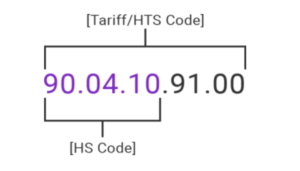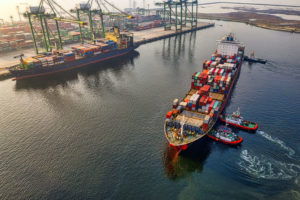Accurate tariff codes mean greater compliance in trade
Topics

In the world of trade, accurate and swift classification of goods is vital for businesses looking to export their products internationally. One key aspect of this process is correctly identifying the Harmonized System (HS) codes, which are essential for determining import duties and tariffs. Failure to get these codes right means a lack of compliance in your trade operations which in turn can lead to shipment delays and even financial penalties which no business wants.
Here, we delve into the importance of getting tariff codes correct for every product shipped whether its 100 SKUs or 10,000 SKUs, and explore the potentially detrimental effects of incorrect classification for businesses exporting internationally. Read on to find out why accurate classification should be a priority for your business in 2024.
Understanding HS Codes
Harmonized System (HS) codes are internationally recognised numerical codes that identify specific products, goods, and commodities being traded. These codes provide a standardised approach to classifying goods and are utilised by customs authorities worldwide to determine appropriate tariffs and regulations.

The importance of accurate HS Codes
There are a number of key benefits in determining the correct tariff code for your goods, both with financial and operational significance.
 1) Tariff Determination: HS codes play a crucial role in calculating import duties and tariffs imposed by customs authorities. The accuracy of these codes directly affects the amount businesses have to pay for importing or exporting goods. Incorrectly assigned codes can result in businesses paying more than necessary, affecting their competitiveness and profit margins.
1) Tariff Determination: HS codes play a crucial role in calculating import duties and tariffs imposed by customs authorities. The accuracy of these codes directly affects the amount businesses have to pay for importing or exporting goods. Incorrectly assigned codes can result in businesses paying more than necessary, affecting their competitiveness and profit margins.
2) Customs Compliance: Customs regulations and procedures vary from country to country. By correctly identifying and applying HS codes, businesses can ensure compliance with specific requirements and avoid potential delays and penalties due to customs complications.
3) Supply Chain Efficiency: Accurate HS codes facilitate the smooth and swift movement of goods across borders. Correct classification enables customs authorities to quickly assess and process shipments. On the other hand, incorrect codes may result in shipment delays, leading to dissatisfied customers, increased operational costs, and lost business opportunities.
Consequences of incorrect HS Codes
When goods are assigned incorrect HS codes the consequences can be severe and impact a business’ entire logistics operations.
 1) Shipment Delays: Misclassification of goods can trigger delays at customs checkpoints. Incorrect HS codes may raise red flags, leading to additional inspections, queries, and the need for clarifications. These delays can disrupt supply chains, impact customer satisfaction, and potentially harm business relationships.
1) Shipment Delays: Misclassification of goods can trigger delays at customs checkpoints. Incorrect HS codes may raise red flags, leading to additional inspections, queries, and the need for clarifications. These delays can disrupt supply chains, impact customer satisfaction, and potentially harm business relationships.
2) Financial Losses: Inaccurate HS codes may result in businesses paying incorrect import duties or being charged higher tariffs. Such financial losses can have a significant impact on profitability, especially for small and medium-sized enterprises (SMEs).
3) Regulatory Non-Compliance: Failing to accurately classify goods and provide correct HS codes can lead to non-compliance with import/export regulations. This non-compliance can result in fines, penalties, or even legal action by customs authorities. Repeat offenses may damage a business’s reputation and hamper its future export activities.
How to mitigate the risks of incorrect HS Codes
Expert tariff code knowledge, team training and the support of an automated HS code classification solution like TariffTel can all streamline the process and reduce the risk of human error in classification. International trade is complex, and so knowledge in this area is crucial to accurately classify goods and avoid costly mistakes. The expert team behind out TariffTel solution means that even the most complex of classifications can be resolved quickly with their unrivalled understanding of the Harmonized System.
Accurate classification of goods using the correct HS codes is an essential component of successful international export operations. Businesses that prioritise getting HS codes right reap numerous benefits, including efficient supply chains, cost savings, and regulatory compliance. Conversely, failure to correctly classify goods can lead to shipment delays, financial penalties, and overall dissatisfaction among customers.
By understanding the importance of accurate HS codes and implementing appropriate measures to mitigate risks, businesses can ensure smooth cross-border trade and maintain their competitive edge in the global marketplace in 2024 and beyond.
Read more about supporting customs classification teams and mitigating risk and also the importance of compliance in trade.
Interested to hear more about how our easy to use TariffTel solution can support your trade operations. Get in touch.
Other Useful Resources
Windsor Framework update: Key details ahead of 1st May 2025 implementation
The Windsor Framework's latest updates come into effect on 1st May 2025, introducing new trading arrangements between Gr...
From spreadsheet chaos to smart compliance
Data accuracy matters more than you think in customs classification. In global trade, the difference between complian...
Adapting to an ever-changing regulatory environment
In the fast-moving world of international trade, compliance is more than just a legal necessity; it’s a competitive ad...



